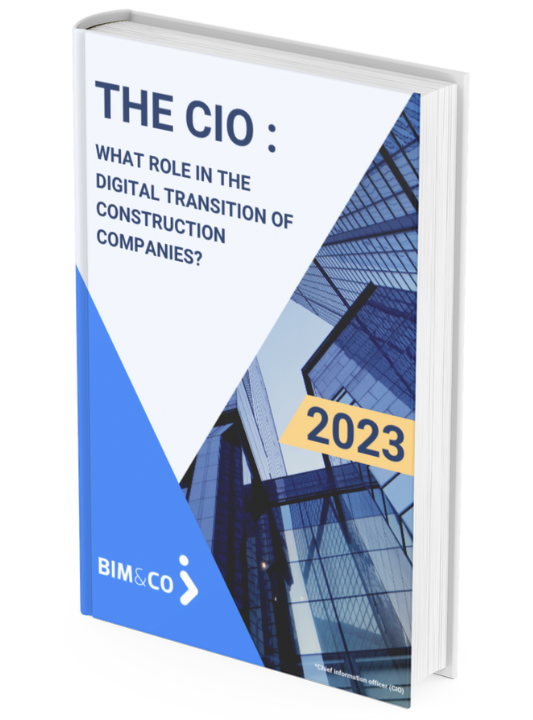Today, digitalisation is omnipresent and is gradually transforming all sectors of activity. Construction companies are no exception to this trend. The speed at which data circulates and the increased storage capacity offered by digital technology have led many construction companies to outsource their services to digital and cloud-based solutions. The aim of this transformation is to reduce costs, increase team productivity and foster greater collaboration.
This digital transition of construction companies is a challenge that requires specific expertise to successfully complete. This is where the Chief Information Officer or CIO comes in. They play an essential role in managing change.
The digital transition in the construction sector is a complex and demanding process. As a result, it is essential to make certain commitments in order to successfully complete this digital transformation and guarantee a company’s success.
The commitments of the Chief Information Officer
Understanding the specific needs of the sector
First of all, construction has its own challenges and requirements in terms of project management, collaboration and activity monitoring. As a CIO, you need to commit to gaining a thorough understanding of your company’s specific needs. This will enable you to implement appropriate technology solutions and meet the expectations of your business teams.
To achieve this, start by conducting a technology watch to identify opportunities for innovation and propose appropriate solutions. You should also carry out in-depth analyses of your company’s existing processes.
Additionally, taking part in industry events and professional associations will keep you up to date with the latest trends and news in the sector.
Establish a digital strategy aligned with the company’s objectives
Then, in collaboration with management and stakeholders, draw up a clear digital strategy. Identify the key areas where digital transformation can add real value. For example, project management, 3D modelling or supply chain management.
Above all, make sure that your digital strategy is in line with the company’s overall vision! Don’t hesitate to involve members of the management team, senior managers and heads of various departments. Organise meetings, workshops or individual interviews with them. You’ll be able to gather their perspectives, needs and expectations in terms of digital strategy.
Here are some ideas for tools to simplify this stage:
- Platforms such as Google Forms or Typeform allow you to create personalised surveys and collect opinions in a structured way. You can share the survey link with participants and easily collect responses.
- For group workshops, tools such as Miro, Mural or Stormboard offer interactive virtual whiteboards. Participants can contribute live with ideas, comments and suggestions.
- For video meetings, tools such as Zoom or Google Meet bring participants together for online workshops. They offer screen sharing and chat functions. Ideal for real-time collaboration!
Encouraging a culture of innovation and collaboration
What’s more, the digital transition is not just about adopting new technologies. It’s also about changing the mindset within the company. As Chief Information Officer, commit to promoting a culture of innovation and collaboration. Encourage teams to propose ideas, test new solutions and share their knowledge. Create an environment conducive to experimentation and continuous learning.
A study conducted by the Construction Management Research Institute at the University of Colorado showed that construction companies that encouraged a culture of innovation and collaboration achieved better results in terms of project performance. These companies were more likely to complete their projects on time and on budget. They were also more likely to achieve high levels of customer satisfaction.
Ensuring seamless integration of information systems
On the other hand, construction often involves numerous stakeholders and a multitude of systems and tools. Your commitment is to ensure the smooth integration of these information systems.
Make sure that the different technological solutions used by the different teams can interact and exchange data seamlessly. This promotes collaboration, effectiveness and overall business efficiency.
Guaranteeing data security as Information Systems Director
With increasing digitalisation, data protection is a major concern. According to the Global State of Information Security Survey 2020 report published by PwC, 51% of companies surveyed said they had suffered an IT security breach in the previous year. This figure highlights the high level of risk that companies face when it comes to data security.
As CIO, you are responsible for implementing robust security measures. In this way, you will protect the company’s sensitive information. Establish solid security protocols. In addition, make employees aware of good IT security practices. And make sure you comply with current data protection regulations.

Promoting training and skills development
Finally, the digital transition requires all employees to develop their skills. Make a commitment to support the training and development of digital skills within the company. Organise training sessions and provide learning resources and tools. Also encourage teams to keep abreast of the latest technological trends in the construction industry.
Platforms such as Elephorm, Educatel and LinkedIn Learning offer a wide range of online courses. These courses focus on BIM, project management, IT and other relevant skills.
Moreover, you can encourage your team to take part in webinars to listen to experts in the field . As well as discover new technologies and approaches, and expand their professional network. Some online events also offer learning and training sessions.
CIO: A central role in the transformation of construction companies.
As has been noted, digitalisation can bring significant benefits to your company. For example, greater productivity, more efficient project management, improved collaboration as well as increased competitiveness in the marketplace.
In this constantly evolving digital era, CIOs play a central role in the transformation of construction companies.
If you would like to find out more about the role of the CIO in the digital transition of construction companies, download our white paper :
“The CIO: what role in the digital transition of construction companies?“.
Discover an in-depth view of the opportunities and best practices for a successful of digital transformation.





